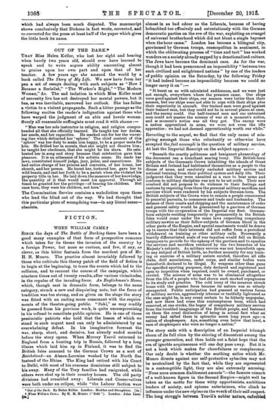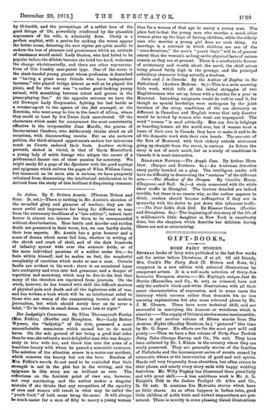PI C TI 0 N.
WHEN WILLIAM CAME.t SINCE the days of The Battle of Dorking there have been a good many examples of that form of prospective romance which takes for its theme the invasion of the court4_ry by a foreign Power, but none so curious, and few, if any, as clever, as this bitter fantasia from the mordant pen of Mr. H. H. Munro. The practice almost invariably followed by those who cultivate this thorny patch of the field of fiction is to begin at the beginning, to trace the events which led to the collision, and to recount the course of the campaign, which nineteen times out of twenty results, after various vicissitudes, in the repulse of the invading force. An. Englishman's Home, which, though cast in dramatic form, belongs to the same category, struck a new and disquieting note, but the force of tradition was too strong, and as given on the stage the story was fitted with an ending more consonant with the require- ments of the theatre-going public. "Saki," as may rEadily be guessed from his previous work, is quite uncompromising in his refusal to conciliate public opinion. He is one of those pessimistic patriots who hold that the lesson of which we stand in such urgent need can only be administered by an overwhelming defeat. In his imaginative forecast the war, sharp, short, and decisive, has already ended months before the story opens. When Murrey Yeovil returned to England from a hunting trip in Russia, followed by a long illness which laid him up in Finland, it was to find the British Isles annexed to the German Crown as a sort of Reichsland—an Alsace-Lorraine washed by the North Sea Instead of the Rhine. The King had retired with his Court to Delhi, with most of his overseas dominions still subject to his sway. Many of the Tory families had emigrated, while others were shut up in their country houses. The old party divisions had crumbled away : Liberals and Conservatives were both under an eclipse, while "the Labour faction were Out of the Dark. By Helen Keller. London Hodder and Stoughton. De.' t When William Cam3. By H. H. klurza (" Saki "). London John Lane.
almost in as bad odour as the Liberals, because of having hobnobbed too effusively and ostentatiously with the German democratic parties on the eve of the war, exploiting an evangel of universal brotherhood which did not blunt a single bayonet when the hour came." London has become a bilingual city, garrisoned by German troops, cosmopolitan in sentiment, in which the obliterating process of " time and tact " has worked wonders on a society already sapped by a denationalized culture. The Jews have become the dominant race. As for the war, though it had been pronounced an impossibility " between two such civilized and enlightened nations " by one of the leaders of public opinion on the Saturday, by the following Friday "it bad indeed become an impossibility because we could no longer carry it on "
"It burst on us with calculated suddenness, and we were just not enough, everywhere where the pressure came. Our ships were good ae.ainst their ships, our seamen were better than their seamen, but our ships were not able to cope with their ships plus their superiority in aircraft. Our trained men were good against their trained men, but they could not be in several places at once, and the enemy could. Our half-trained men and our untrained men could not master the science of war at a moment's notice, and a. moment's notice was all they got. The enemy were a nation apprenticed in arms, we were not even the idle apprentice : we had not deemed apprenticeship worth our while."
Reverting to the sequel, we find that the only cause of mis- giving amongst those who reluctantly or otherwise have accepted the fait accompli is the question of military service. At last the Imperial Rescript on the subject appears :— "Beneath the courtly politeness and benignant phraseology of the document ran a trenchant searing irony. The British-born subjects of the Germanic Crown inhabiting the islands of Great Britain and Ireland had habituated themselves as a. people to the disuse of arms, and resolutely excluded military service and national training from their political system and daily life. Their judgment that they were unsuited as a race to bear arms and conform to military discipline was not to be set aside. Their new overlord did not propose to do violence to their feelings and customs by requiring from them the personal military sacrifices and services which were rendered by his subjects German-born. The British subjects of the Crown were to remain a people consecrated to peaceful pursuits, to commerce and trade and husbandry. The defence of their coasts and shipping and the maintenance of order and general safety would be guaranteed by a garrison of German troops with the co-operation of the Imperial war fleet. German- born subjects residing temporarily or permanently in the British Isles would come under the same laws respecting compulsory military service as their fellow-subjects of German blood in the other parts of the Empire, and special enactments would be drawn up to ensure that their interests did not suffer from a periodical withdrawal on training or other military calls. Necessarily a heavily differentiated scale of war taxation would fall on British taxpayers to provide for the upkeep of the garrison and to equalize the services and sacrifices rendered by the two branches of his Majesty's subjects. As military service was not henceforth open to any subject of British birth, no further necessity for any train- ing or exercise of a military nature existed, therefore all rifle clubs, drill associations, cadet corps, and similar bodies were henceforth declared to be illegal. No weapons other than guns for specified sporting purposes, duly declared and registered and open to inspection when required, could be owned, purchased, or carried. The science of arms was to be eliminated altogether from the life of a people who had shown such marked repugnance to its study and practice. The cold irony of the measure struck home with the greater force because its nature was so utterly unexpected. Public anticipation had guessed at various forms, of military service, aggressively irksome or tactfully lightened as the case might be, in any event certain to be bitterly unpopular, and now there had come this contemptuous boon, which had removed, at one stroke, the bogey of compulsory military service from the troubled imaginings of the British people, and fastened on them the cruel distinction of being in actual fact what an enemy had called them in splenetic scorn long years ago—a nation of shopkeepers. Aye, something even below that level, a race of shopkeepers who were no longer a nation."
The story ends with a description of an Imperial triumph shorn of its full rites by the stirring of discontent among the younger generation, and thus holds out a faint hope that the era of ignoble acquiescence will one day pass away. But it is not a book which makes for cheerfulness or complacency. Our only doubt is whether the scathing satire which Mr. Munro directs against our self-protective sybarites may not be neutralized by the fact that, while they are represented in a contemptible light, they are also extremely amusing. "Nous nous sommes diablement amuses"—the famous remark of a well-known figure in the Second Empire—might well be taken as the motto for these witty opportunists, ambitious leaders of society, and epicene entertainers, who climb to influence under the new regime on the wreck of their self-respect.
The long struggle between Yeovil's nobler nature, enfeebled,
by ill-health, and the promptings of a selfish love of the good things of life, powerfully reinforced by the plausible arguments of his wife, is admirably done. Cicely is a perfect sophist, with a genius for making the worse appear the better cause, detesting the new regime yet quite unable to endure the loss of pleasure and prominence which an attitude of resistance would entail. Irady Shalem, who had failed to be popular before the debeicle because she tried too hard, welcomes the change wholeheartedly, and there are other representa- tives of this frankly sans-patrie type. One of the worst is the sleek-headed young pianist whose profession is described as "having a great many friends who have independent incomes," who played bridge almost as well as he played the piano, and for the rest was "a rather good-looking young animal, with something between talent and genius in the piano-playing line." At the opposite extreme we have the old Dowager Lady Greymaster, fighting her last battle as a counter-agent to the agents of the fait accompli, or the Kerricks, who went away to live in the heart of Africa, where they could at least fly the Union Jack unmolested. Of the characters which make for amusement the most consistently effective is the irrepressible Joan Mardle, the genius of Inconvenient Candour, who deliberately thinks aloud on all occasions, with disconcerting results. But as she eschews politics, the thick-skinned opportunists endure her intrusions much as Courts endured their fools. Another striking portrait, etched in vitriol, is that of Gorki. Mnstelford, a young lady of noble lineage who adopts the career of a professional dancer out of sheer passion for notoriety. We might easily fill a page of the Spectator with the good sayings and epigrams which enliven the pages of When William Came, but inasmuch as its main aim is serious, we have purposely refrained from discounting the intellectual exhilaration to be derived from the study of this brilliant if disquieting romance.











































 Previous page
Previous page